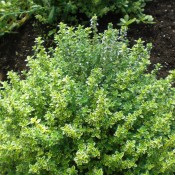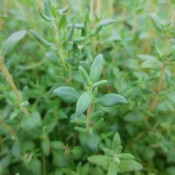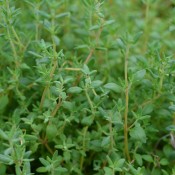Thymus vulgaris
Thyme grows trouble-free in an herb garden, along a pathway, or in a container. A garden bed needs no special preparation before planting thyme as it grows well in average soil. Thyme grows to a low bushy mound of small, dark green leaves with attractive pink to purple flowers in midsummer. Thyme is highly aromatic with a sweet and peppery flavour. It is a favourite in Italian and French recipes; adds zest to stews, soups, sauces, seafood and meats.
Thyme is a beneficial garden plant. It repels cabbage moths making it an excellent companion plant to Brassicas (i.e. broccoli, cabbage, kale, etc.). It is also known to improve the flavour of strawberries.
| Harvesting | Cut leafy stems as needed during the growing season. In early summer, just before the plant blooms, make a full harvest by shearing the plant 2 inches (5cm) above ground level. The plant will re-sprout and can be cut again in the same manner in late summer. |
|---|---|
| Storing | After a full harvest, gather stems in a bunch and put them in a paper bag, tip end down. Hang them to dry in a warm place with good air circulation. Strip dried leaves from the stems. Store the leaves in an airtight container. |
| Maturity | 56 – 64 days |
| Height | 6 - 12” (15 - 30 cm) |
| Spacing | 10 - 12” (25 - 30 cm) |
| Light | Full Sun |
| Soil | Organic and well draining |
| pH Range | 6.5 to 7.0 |
| Watering | Evenly moist allowing soil to dry between watering |
| Fertilizing | Balanced fertilizer at time of planting |
| Nutrients Required | Nitrogen=high, Phosphorus=moderate, Potassium=moderate |
Back to Organic Edibles.



